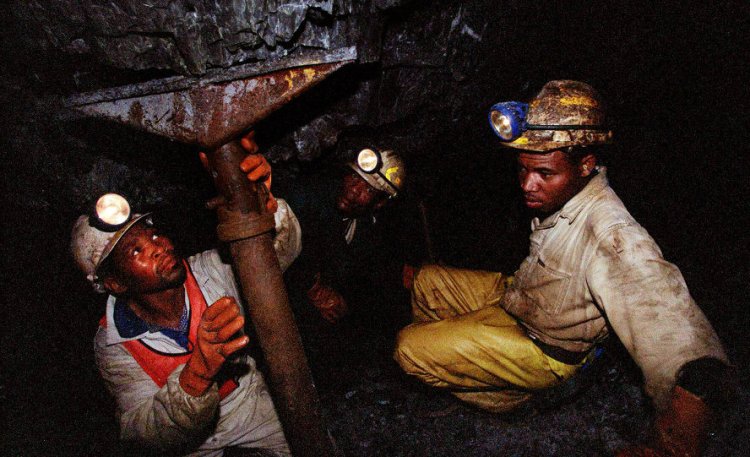Africa Urged to Use Critical Minerals to Drive Green Energy Industrialisation
Dlamini stressed that the real opportunity lies in local beneficiation and value addition, ensuring that minerals mined in Africa become inputs into African manufacturing industries.

- Country:
- South Africa
Africa – and South Africa in particular – must seize the moment to transform its vast reserves of critical minerals into the foundation for an industrial revolution that places the continent at the forefront of the global green energy transition.
This was the central message delivered by Sthembiso Dlamini, an executive of the Gauteng Growth and Development Agency (GGDA), during the African Critical Minerals Summit held in Johannesburg on Monday.
Africa at the Heart of the Energy Transition
Dlamini emphasised that Africa holds a uniquely powerful position in the global economy, boasting immense deposits of minerals such as platinum, manganese, lithium, cobalt, chromium, and rare earth elements—all of which are indispensable for renewable energy technologies and advanced manufacturing.
“From cobalt and lithium to rare earth and platinum group metals, Africa holds some of the most strategic mineral deposits in the world. Yet the key question before us is: how do we move beyond simply being exporters of raw resources to becoming global leaders in beneficiation, industrialisation, and sustainable growth?” she asked.
According to Dlamini, Africa accounts for:
-
Nearly a third of the world’s critical mineral reserves,
-
Over 70% of global platinum and chromium deposits,
-
Nearly half of global cobalt and manganese, and
-
Some of the world’s largest phosphate reserves.
This resource base, she argued, makes Africa “central to the global energy transition, technological advancement, and industrial development.”
Moving Beyond Raw Exports
For decades, Africa’s mineral wealth has largely been exported in raw form to be processed abroad, often leaving the continent with minimal economic benefit. Dlamini stressed that the real opportunity lies in local beneficiation and value addition, ensuring that minerals mined in Africa become inputs into African manufacturing industries.
“With the African Continental Free Trade Area (AfCFTA) as a unifying framework, these resources can power regional value chains—from processing and refining to advanced manufacturing—rather than being shipped overseas as ores,” she said.
She argued that such an approach could turn Africa into a global hub for the production of electric vehicle batteries, renewable technologies, and green industrial inputs, stimulating new industries and creating thousands of jobs.
Beneficiation as a Developmental Necessity
Dlamini framed beneficiation not merely as an economic opportunity but as a developmental necessity for Africa.
“By processing and adding value to our minerals locally, we create jobs, stimulate new industries, and build stronger linkages across manufacturing, energy, and technology sectors. This is how we unlock greater returns for our people and ensure that the wealth of our natural resources translates into long-term prosperity,” she said.
Industrialisation anchored on critical minerals, she added, offers Africa a once-in-a-generation opportunity to position itself at the centre of global supply chains for green technologies, renewable energy, and electric mobility.
Regional Integration and Partnerships
To achieve this vision, Dlamini called for regional integration, infrastructure development, and strong public-private partnerships.
“By leveraging these partnerships, Africa can truly shift from being at the margins of global value chains to being at the heart of them,” she said.
This includes investing in transport and energy infrastructure, aligning national industrial policies, and ensuring that African countries collaborate rather than compete in global mineral markets.
Balancing Growth with Sustainability
Dlamini cautioned, however, that Africa’s mineral strategy must be sustainable and inclusive. Communities near mining operations must see tangible benefits, ecosystems must be protected, and governance must guarantee transparency and accountability.
“Our approach to critical minerals must balance economic opportunity with environmental stewardship and social responsibility. Communities must benefit directly. Ecosystems must be protected. Only then can Africa’s critical minerals become a catalyst for inclusive and resilient growth,” she said.
The Road Ahead
As the global demand for clean energy solutions, electric vehicles, and advanced batteries surges, Africa’s mineral reserves place it in a position of unprecedented opportunity. The challenge now lies in shifting from being raw material suppliers to global industrial leaders, ensuring that the continent’s mineral wealth translates into jobs, industries, and prosperity for future generations.
ALSO READ
India's Lithium Leap in Jharkhand: A New Era of Mineral Self-Reliance
Mahama Pitches Ghana as AfCFTA Gateway at Africa–Singapore Business Forum
India's Battery Manufacturing Dilemma: Lithium Dependence on China
PM Modi inaugurates lithium-ion battery manufacturing facility supporting hybrid and electric vehicle battery production.
India's Energy Revolution: Leading with Lithium-Ion Storage Solutions










